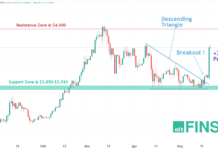Kenya is one African country that direly needs financial reform. However, to introduce such sea changes, the country first needs to embrace new technologies. And this is where blockchain technology is expected to play a crucial role. Kenya’s informal economy, which currently has a $20 billion value, will certainly benefit from blockchain-based immutable ledgers and other tools.
For instance, a Kenyan company dealing in fresh produce buys and sells its goods using blockchain technology to track all vendor transactions.
The results have been encouraging: lower costs, the ability to track all transaction histories which in turn have enabled vendors in the informal economy to gain access to micro-loans for growing and expanding their businesses.
Kenya’s informal economy
Most African nations show some interesting characteristics and ways of functioning when it comes to matters of finance. Corruption and political instability are rampant and these factors cause Western banks to shy away from them. Moreover, their local financial institutions have been plagued by a number of problems over the last few years. That’s why financial inclusion continues to be one of the most major concerns in countries like Kenya.
Its informal economy, however, is growing. A plethora of small-scale retailers exists and continues to grow in this region and their methods to access loans and buy goods are somewhat different. They don’t get official credit ratings, even though the Kenyan small-scale retail industry records an annual net worth of over $20 billion.
This glaring problem will not be easily solvable because, for small entrepreneurs, cost-cutting and building an acceptable credit track record are key challenges. In addition, for them to forge new partnerships with providers of financial services and suppliers is yet another problem.
How would blockchain solutions help?
Given the present situation, it appears that blockchain technology could be a panacea to all these problems. Blockchain allows businesses to evolve and build up immutable records. Thus, in a situation devoid of official credit-scoring, such transparent ledgers would offer many benefits.
Twiga Foods is a Kenyan company that uses blockchain for its daily operations. It buys wholesale fresh produce and sells to smaller entrepreneurs. Using blockchain technology, Twiga monitors all orders, supplies, and payments.
This is one isolated example and raises doubts about whether it will close the lending gap. Unless blockchain-based technology is used extensively to create transparency in business operations, accessing loans for micro-sized businesses in Kenya could remain an issue.














